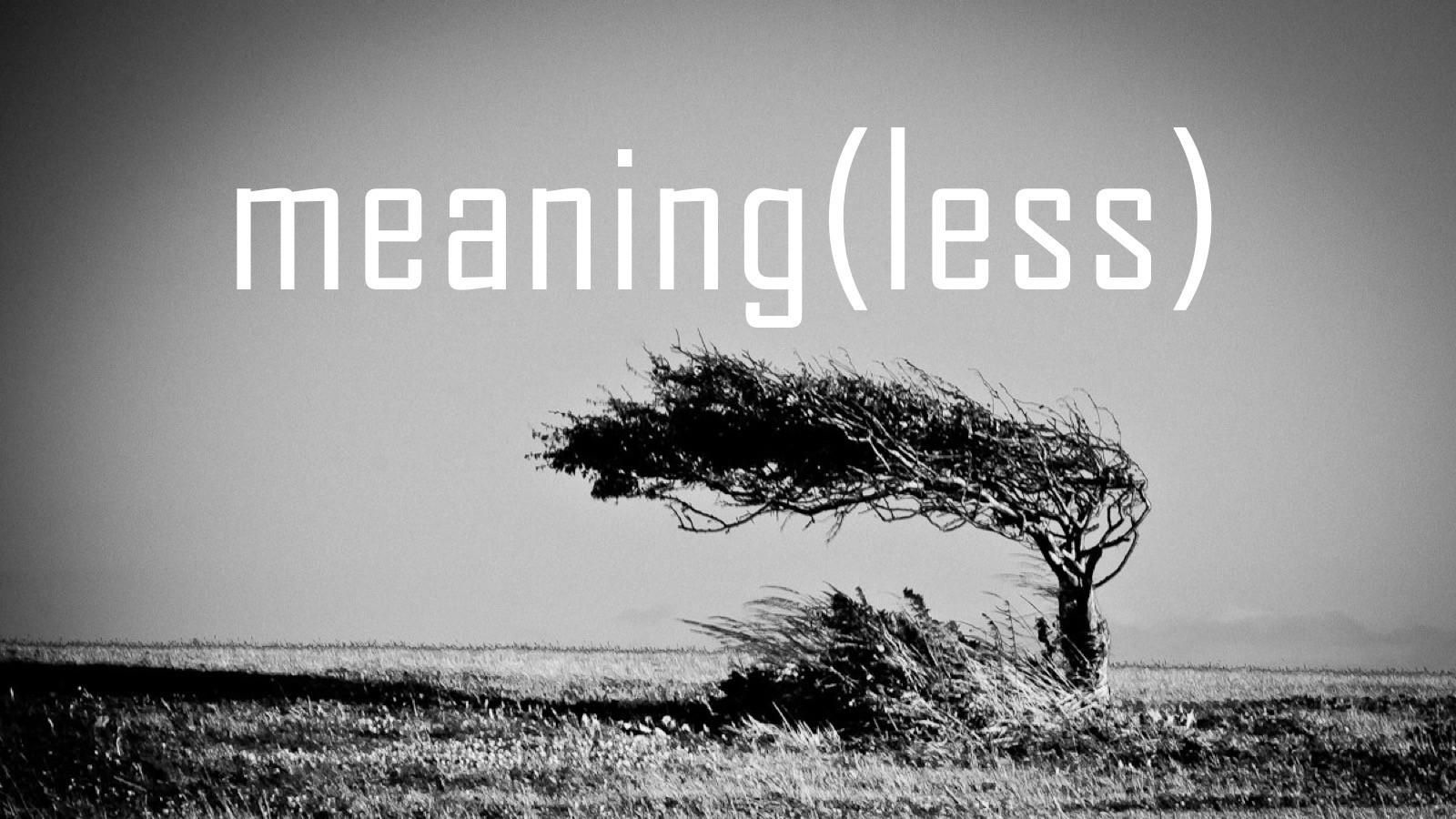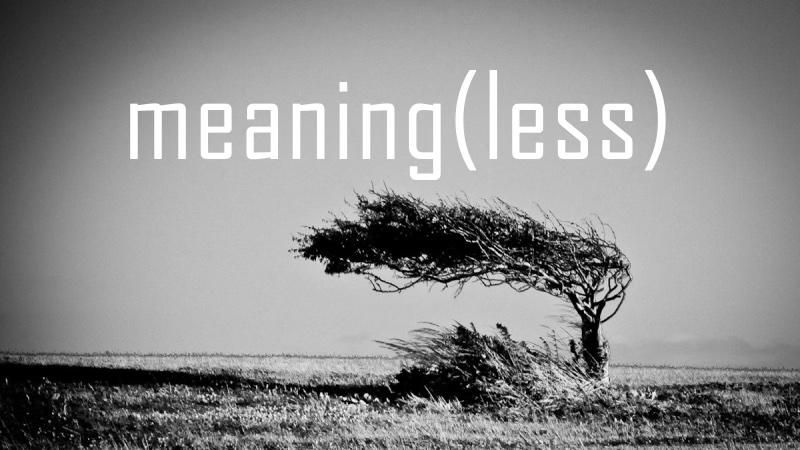05 Meaning(Less)
MEANING (LESS)
“Living Wisely in a World of Fools” Download here
Ecclesiastes 9-10
What will you hear today? There will be two sources of listening, if you’ll participate. One is listening to my words. God may spark something inside of you as your mind traces what I say. But more, the second source. The most important source. Let God speak through His Word. Your Bible open before you. Your phone or tablet open to a Bible app. Listen. God wants to speak, and He does. But we have to listen.
1). Living wisely involves accepting deaths reality (9:1-10)
Solomon has already dealt with this subject in Chapter 7. “It’s better to go to the house of mourning than to the house of feasting, for this is the end of all mankind.” Death is inevitable. And we live in a culture that denies that more and more. The basis of many of our neuroses and anxiety and most of our fears is the reality that we don’t want to face this truth. Living wisely means we do.
An English poet laureate wrote,
“Oh, why do people waste their breath
Inventing dainty names for death?”
We live in a day that has become skilled in denying the ultimate reality of death. We have renamed it. We pay a great deal of money to make the person lying in the casket look natural…meaning, alive. “They look so natural.” I love the Woodie Allen quote that he gave in an interview where he said, “I’m not afraid to die. I just don’t want to be there when it happens.” Sometimes, we don’t even bring the deceased to the funeral.
Paul Simon wrote a song in 1965 called “Flowers Never Bend with the Rainfall.” I saw the Broadway production just a few weeks ago with my kids. In this song, Simon writes, “So I’ll continue to continue to pretend that my life will never end, and flowers never bend with the rainfall.” But they do bend. And our lives do have an end.
Death is a serious thing, because sin is a serious thing. God never wanted death to be a part of His perfect creation. It wasn’t. Sin…our choice to sin…made death a necessity. “The wages of sin is death…”
I have stood on the porch of a funeral parlor with young men big enough to wrestle a bear. But they were terrified to go inside and view their mother’s remains. Why is that? Death reminds us…this is our fate. It is going to happen to all mankind. We grieve our own death. The Bible is unambiguous about death. “Ring around the rosie, a pocket full of posies, ashes ashes we all fall down.” But death has become something akin to a profanity. It’s offensive to us to be reminded that it is our fate; that God has numbered our days. That, “it is appointed unto man once to die, and then the judgment.” If we just live “under the sun,” without taking God into account, there’s a period there. But for the Christian, when death comes, another kind of life just begins!
2). Living wisely involves acknowledging life’s unfairness (9:11-18)
Everybody dies. The wise man is buried beside the wicked man. Living righteously does not guarantee a longer life or a more honorable death and burial. Death equalizes it all. The best person isn’t always rewarded under the sun… “the race doesn’t go to the fastest, or the battle to the strongest…” The good man isn’t always remembered under the sun…
We are morbidly fascinated with Job because of the unfairness of his circumstances. We are magnificently humbled with Jesus because of His acceptance of the cross…the ultimate unfairness and injustice…Jesus was crucified by religious fools…which He endured without fighting back or speaking back…but he died on the cross and endured and absorbed death and sin’s penalty for the rest of us sinful fools…religious and non-religious alike.
3) Living wisely involves attention to the small things (10)
So just what is a fool?
a. Fool: Doesn’t know what he doesn’t know. So, he goes to school. I may know lots about genetic engineering, but if you slide me under a car on a lift and tell me to repair the transmission, I wouldn’t know where to start
b. Student: Learns what he doesn’t know. That’s why we get an education. But we don’t get answers. Not important ones. You will probably live long enough to see everything you learn in school become obsolete (tubes to integrated circuits). / They told us after two intense years of study, “You now know enough about electronics to go out and really hurt yourself…All you learn in school is what you don’t know.
c. Graduate: Knows the right question to ask…a graduate simply knows more questions that she doesn’t know how to answer. Wisdom is painful, Solomon reminds us. The more we know, the more we learn what we could be, but aren’t.
“If any man lacks wisdom…” (God gives wisdom “freely” and without partiality…no student loans necessary). Solomon’s prayer at the beginning of his reign was “God give me wisdom to lead your people.” God was impressed. And He’s equally pleased with you if you’ll ask! Wisdom pays attention to the small things.
a. Fly in ointment/ bird in filter (My church was on a cistern…thought that was what we called women…” brethren and cistern” …I also thought a bush hog was a pig that ate landscaping). A little thing can pollute a big thing. A little fly spoils the ointment. A little foolishness, a little self-indulgence, a little indiscretion can destroy a thirty-year marriage. “But honey, it was just a little affair…” Stay in tune with the little things.
b. Doing work with integrity … watch the little things…Do what you KNOW to do…don’t fall in the hole…sharpen your axe…watch for falling rocks.
c. Watch your tongue (Charm the serpent in your mouth). I learned in communication classes that, for every statement made there are six possible ways to interpret it. That means you have a one-in-six chance of being understood when you speak. Warren Wiersbe identified five different kinds of tongues
i. Destructive tongues (v 12). “The tongue is small but can start a forest fire.” This is the tongue of the gossip. The rumor monger. The tale bearer. The person that posts an untrue statement online.
ii. Irrational tongues (v 13). Talking nonsense. Much of what is said and written today falls into that category. A New Age speaker named Doreen Virtue, who has written numerous books and is flown around the world to give lectures and conferences renounced her writings and speeches when she became a Christian.
iii. Uncontrolled tongues (v 14a). “I can’t help it…I have to say what I think even if it hurts your feelings.” You can always control your tongue if you want to.
iv. Boastful tongues (v 14 b-c) Boasting about a future they don’t know, and they can’t control. Can’t find their way. “Self-praise stinketh.” “So dumb, he’d get lost on an elevator.”
v. Indiscreet tongue (v 20). The world celebrates and elects fools…. don’t be one. The fact that they are applauding you may not be a compliment. Live with wisdom.
As Solomon concludes his argument, he critiques those in leadership. He includes, we are certain, himself in the critique! Four kinds of people (fools) find their way into leadership.
They are …
- Immature leaders (vv 16-17)
- Incompetent leaders. (v 18)
- Indifferent leaders. (v 19)
- Indiscreet leaders (v 20)
It’s hard to imagine that a part of this was a job review of his own staff! Solomon was surrounded by leaders and advisers in his role as the King of Israel. He saw each of these in turn. The first, maybe is more like Solomon than the other three. He certainly was not incompetent, or indifferent, though perhaps he was indiscreet. But most certainly he came to the throne as an immature king. Some of his decisions were decisions that an immature leader would have made (see his propensity for foreign women).
Leaders who do not lead well do much damage to their business or, in the case of governmental leaders, to the people they lead. He is right to call for wisdom among those who are responsible and in charge of others.
Life is a gift… live it… live so the mortician has to pry the smile off your face! Death is coming…prepare for it! A wise person lives knowing that death comes but doesn’t allow that reality to stop him from living. In fact, it propels him to take life with more intensity.


